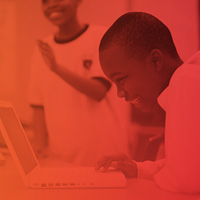Total Awarded: $12 Million
Total Grants: 85
Duration: 2005 - Present
Geographic Focus: Mostly in the United States
Background
The increased availability and accessibility of digital media have changed the ways in which young people learn, socialize, play, and engage in civic life. Seeking to understand how learning environments and institutions should transform to respond to these changes, the MacArthur Foundation (the Foundation) launched the Digital Media and Learning (DML) Initiative. The DML Competition (the Competition), one component of the DML Initiative, identifies innovators and invests in prototypes of games, mobile phone applications, virtual worlds, social networks, digital badge platforms, and more in support of connected learning. The Competition completed four cycles between 2007 and 2014, awarding individuals, universities, for-profit organizations, and nonprofit organizations.
What We Evaluated
The evaluation of the DML competition was conducted by Informing Change. Their evaluation focused on the Competition’s goals, processes, and perceived impacts on awardees, awarded projects, the DML landscape, and the Foundation. Along with site visits and a review of relevant Competition and grantee documents, the mixed-methods evaluation incorporated interview and survey data collected from Foundation staff, Humanities, Arts, Science, and Technology Alliance and Collaboratory (HASTAC) staff who implemented the Competition, Competition awardees and finalists, and key field leaders.
What We Learned
-
The Competition has left lasting impressions on awardees in how they think about DML and its relationship to their work. It has positively influenced the professional lives of most awardees and many finalists, allowing them to develop technical skills and build a network of contacts.
-
Most awardees continued some part of their project work after the Competition ended, and some finalists have made progress on their proposed projects despite not receiving a Competition award.
-
Awardees’ most common implementation challenges were related to project management and reaching the targeted audiences for their work. However, awardees found the support they received from the HASTAC team very beneficial to their work, finding them especially helpful when building connections with other awardees and leaders in the DML landscape.
-
Many awardees believed that more communication with Competition implementers and a formal mentorship component would greatly enhance the program and increase the success of their projects.
-
The Competition, along with the rest of the DML Initiative, has made considerable progress in identifying and shaping the DML landscape. It has spurred national conversation around “hot topics” in the DML landscape. Informants point to the emerging networks around gaming for education and digital badges as clear examples of the Competition’s influence.
- The Competition has introduced connected learning to a variety of audiences and produced some important examples of the framework in action and its potential impact.
More Information
Download the full evaluation ›
View MacArthur evaluation philosophy ›



